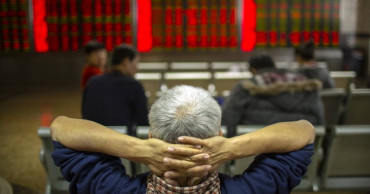World shares
World shares up after First Republic aid spurs Wall St rally
Markets advanced Friday in Europe and Asia, tracking a rally on Wall Street after a group of big banks offered a lifeline to First Republic Bank, the latest U.S. lender in the spotlight for troubles in the banking industry.
Shares rose in Paris, London, Tokyo and Hong Kong but edged lower in Mumbai. U.S. futures edged higher, while oil prices gained.
The S&P 500 jumped 1.8% Thursday, erasing earlier losses following reports that First Republic Bank could get help or sell itself to another bank. Markets have gyrated this week on concerns over the toll on banks from the fastest set of interest rate hikes in decades. The turmoil flared with last week’s collapse of Silicon Valley Bank, the second largest bank failure in U.S. history.
“The market remains cautious; traders do not want to get overexcited, especially with investors still focusing on what can go wrong instead of what could go right,” Stephen Innes of SPI Asset Management said in a report.
Germany's DAX gained 0.9% in early trading, to 15,102.37 and the CAC 40 in Paris was up 0.7% at 7,075.74. In London, the FTSE 100 rose 0.8% to 7,471.98.
The future for the S&P 500 inched 0.1% higher while that for the Dow Jones Industrial Average was unchanged.
Also Read: Asian shares mostly sink on jitters after US bank failure
In Asia, Hong Kong's Hang Seng jumped 1.8% to 19,548.26 and the Shanghai Composite index added 0.7% to 3,450.55.
Tokyo's Nikkei 225 index gained 1.2% to 27,333.79 and the Kospi in Seoul was up 0.8% at 2,395.69. Shares in major Japanese banks rebounded after falling sharply at times this week.
Australia's S&P/ASX 200 added 0.4% to 6,994.80. India's Sensex was 0.1% higher while Taiwan's Taiex surged 1.5%.
Stocks rallied Thursday on Wall Street after 11 of the biggest banks offered help for First Republic with a combined deposit of $30 billion.
Since SVB's failure, investors have been on the lookout for banks with similar traits, such as many depositors with more than the $250,000 limit that’s insured by the Federal Deposit Insurance Corp., tech startups and other highly connected people who can spread worries about a bank’s strength quickly.
First Republic Bank rose 10% Thursday after slumping as much as 36% early in the day.
The Federal Reserve’s fastest barrage of hikes to interest rates in decades, to drive down inflation, has shocked the banking system following years of historically easy conditions. Higher rates raise the risk of recession and hurt prices for stocks, bonds and other investments. That latter factor hurt Silicon Valley Bank, since high rates forced down the value of its bond investments.
U.S. Treasury Secretary Janet Yellen told a Senate committee on Thursday that the nation’s banking system “remains sound” and Americans “can feel confident” about their deposits.
Wall Street increasingly expects this week's turmoil to push the Federal Reserve to hike interest rates next week by only a quarter of a percentage point. That would be the same sized increase as last month's, half the hike of 0.50 points that was earlier expected.
The European Central Bank on Thursday raised its key rate by half a percentage point, brushing aside speculation that it may reduce the size because of all the turmoil around banks.
All the stress in the banking system has raised worries about a potential recession because of how important smaller and mid-sized banks are to making loans to businesses across the country. Oil prices have slid this week on such fears.
Reports on the U.S. economy are showing mixed signals. A report said fewer workers applied for unemployment benefits last week than expected.
In other trading, U.S. benchmark crude oil gained 73 cents to $69.08 a barrel in electronic trading on the New York Mercantile Exchange. It picked up 74 cents on Thursday to $68.35 a barrel.
Brent crude, the pricing basis for international trading, climbed 78 cents to $75.48 a barrel.
The dollar fell to 133.26 Japanese yen from 133.76 yen. The euro rose to $1.0664 from $1.0611.
2 years ago
World shares sink after inflation driven retreat on Wall St
Shares declined in Europe and Asia on Thursday after a broad retreat on Wall Street triggered by worries over the impact of persistent high inflation on corporate profits and consumer spending.
U.S. futures were lower, while oil prices advanced.
Germany’s DAX lost 2% to 13,731.64 and the CAC 40 in Paris declined 1.9% to 6,234.78. Britain’s FTSE 100 shed 1.7% to 3,537.99. The future for the S&P 500 was 1% lower while the future for the Dow Jones Industrial Average sank 0.9%.
The Dow industrials sank more than 1,100 points, or 3.6% on Wednesday, and the S&P 500 had its biggest drop in nearly two years, shedding 4%. That was its steepest decline since June 2020. The tech-heavy Nasdaq fell 4.7%.
The benchmark index is now down more than 18% from the record high it reached at the beginning of the year. That’s just shy of the 20% decline that’s considered a bear market.
“The sentiment in the market is highly negative as traders and investors are largely concerned about an economic downturn and soaring inflation,” Naeem Aslam of Avatrade said in a commentary.
The Federal Reserve is trying to temper the impact from the highest inflation in four decades by raising interest rates. Many other central banks are on a similar track. But the Bank of Japan has stuck to its low interest rate policy and the gap between those benchmark rates of the world’s largest and third-largest economies has pushed the dollar’s value up against the Japanese yen.
Japan reported a trade deficit for April as its imports ballooned 28%. The shift reflects surging energy costs amid the war in Ukraine and a weakening of the yen against the U.S. dollar.
Japan’s exports grew to 8.076 trillion yen ($63 billion) last month, up 12.5% from the previous year, according to Ministry of Finance data released Thursday. Imports totaled 8.915 trillion yen ($70 billion) in April, up from 6.953 trillion yen in April 2021, and the highest since comparable numbers began to be taken in 1979.
The Nikkei 225 in Tokyo lost 1.9% to 26,402.84 and the Hang Seng in Hong Kong dropped 2.5% to 20,120.60. In South Korea, the Kospi shed 1.3% to 2,592.34, while Australia’s S&P/ASX 200 gave up 1.7% to 7,064.50.
Also Read: Asian shares fall amid interest rate, earnings worries
The Shanghai Composite index reversed earlier losses, gaining 0.4% to 3.096.96.
On Wednesday, retailer Target lost a quarter of its value after reporting earnings that fell far short of analysts’ forecasts. Inflation, especially for shipping costs, dragged its operating margin for the first quarter to 5.3%. It had been expecting 8% or higher.
The company warned that its costs for freight this year would be $1 billion higher than it estimated just three months ago.
The report comes a day after Walmart said its profit took a hit from higher costs. The nation’s largest retailer fell 6.8%, adding to its losses from Tuesday.
Target and Walmart each provided anecdotal evidence that inflation is weighing on consumers, saying they held back on purchasing big-ticket items and changed from national brands to less expensive store brands.
The weak reports stoked concerns that stubbornly rising inflation is putting a tighter squeeze on a wide range of businesses and could cut deeper into their profits.
Other big retailers also have racked up hefty losses.
The data are not entirely consistent. On Tuesday, the market cheered an encouraging report from the Commerce Department that showed retail sales rose in April, driven by higher sales of cars, electronics, and more spending at restaurants.
Investors worry the Fed could trigger a recession if it raises interest rates too high or too quickly. Worries persist about global growth as Russia’s invasion of Ukraine puts even more pressure on prices for oil and food while lockdowns in China to stem COVID-19 cases worsens supply chain problems.
In other trading, benchmark U.S. crude oil rose 56 cents to $110.15 per barrel in electronic trading on the New York Mercantile Exchange. It dropped $2.81 to $109.59 on Wednesday.
Brent crude, the basis for pricing for international trading, climbed $1.19 to $110.30 per barrel.
The dollar fell to 128.14 Japanese yen from 128.20 yen late Wednesday. The euro strengthened to $1.0481 from $1.0464.
3 years ago
World shares up, US futures sink as Russia moves toward Kyiv
World shares advanced Friday but U.S. futures were lower as Russian troops pressed toward the capital of Ukraine.
Market benchmarks rose in London, Paris, Tokyo and Shanghai but fell in Hong Kong. Russian shares gained 15%, rebounding after a nosedive on Thursday as the invasion of Ukraine began.
The price of oil hovered just below $100 per barrel and prices of most other commodities fell after surging the day before.
Despite uncertainty about the Ukraine and worries over inflation and the pandemic, an overnight turnaround on Wall Street seemed to buoy Asian and European shares.
Investors appeared relieved that sanctions against Russia were not as severe as they might have been, even as Ukraine’s president pleaded for international help to fend off an attack that could topple his democratically elected government, cause massive casualties and ripple out damage to the global economy.
France's CAC 40 edged up 0.6% in early trading to 6,562.96, while Germany's DAX rose 0.2% to 14,083.92. Britain's FTSE 100 gained 1.2% to 7,295.52.
Read: Ukraine's capital under threat as Russia presses invasion
But U.S. futures augured a less upbeat start for New York markets, with the future for the benchmark S&P 500 down 1.2% while the contract for the Dow industrials was 1% lower.
Russia was pressing its invasion of Ukraine to the outskirts of the capital Friday after unleashing airstrikes on cities and military bases and sending in troops and tanks from three sides in what amounts to the largest ground war in Europe since World War II.
Market players might be betting that the crisis could slow moves by central banks to cool inflation by raising interest rates and unwinding other support for pandemic-burdened economies, said Ipek Ozkardeskaya of Swissquote Bank SA.
“But in reality, it’s about volatility, high volatility that results from a high-voltage environment," Ozkardeskaya wrote in a commentary. “This morning, the US equity futures are again in the red. It’s impossible to tell what direction the market will take in the next five minutes. The only certainty is uncertainty, and this is how it will be for the next couple of sessions unfortunately."
The Russian invasion of Ukraine caused a barrage of new, targeted financial sanctions meant to isolate, punish and impoverish Russia in the long term.
But U.S. and European officials have held back on one key financial measure, choosing for now not to boot Russia off SWIFT, the dominant system for global financial transactions.
Japan on Friday announced new sanctions on Russia, including freezing the assets of Russian groups, banks and individuals and suspending exports of semiconductors and other sensitive goods to military-linked organizations in Russia.
Earlier in the week, Tokyo suspended new issuances and distribution of Russian government bonds in Japan, to reduce financing opportunities for Russia. It also banned trade with the two Ukrainian separatist regions.
Read:Explosions heard in Kyiv early Friday as Russia presses Ukraine assault
But while most nations in Asia rallied to support Ukraine, China denounced sanctions against Russia, blaming the United States and its allies for provoking Moscow.
In Asian trading, Japan's benchmark Nikkei 225 surged 2.0% to finish at 26,476.50. Australia's S&P/ASX 200 lost some of its earlier gains to close 0.1% higher at 6,997.80. South Korea's Kospi jumped 1.1% to 2,676.76. Hong Kong's Hang Seng lost 0.6% to 22,767.18, while the Shanghai Composite rose 0.6% to 3,451.41.
Russia and Ukraine are major producers of both energy and grains and other commodities and the conflict pushed prices of many higher, adding to inflationary headaches for central banks.
Asian economies already reeling from the pandemic are particularly vulnerable to rising energy costs. Japan imports almost all its energy, although its purchases from Russia are limited.
On Friday, benchmark U.S. crude was up 59 cents at $93.40 a barrel in electronic trading on the New York Mercantile Exchange. Brent crude, the basis for international oil prices, added $1.08 to $96.50 a barrel.
Prices for energy have surged more in Europe than in the U.S. because its economy is more closely tied to Russia and Ukraine. The spot price in Europe for natural gas has jumped more than 50%.
Higher energy and food prices are amplifying worries about inflation, which in January was at its hottest level in the United States in a couple generations, and about what the Federal Reserve will do to rein it in.
The U.S. Fed looks certain to raise rates beginning next month for the first time since 2018. Although it sometimes has delayed big policy decisions in times of geopolitical uncertainty, such as the Kosovo war and the U.S. invasion of Iraq, economists say they still expect it to act to tamp down inflation. A major concern is whether it can do that without choking the economy into recession.
In currency trading, the U.S. dollar inched down to 115.25 Japanese yen from 115.48 yen. The euro cost $1.1189, up from $1.1204.
The Russian ruble was down 1.5% at 83.75 to the dollar.
4 years ago
World shares drop after Putin orders troops to east Ukraine
Shares fell sharply in Asia on Tuesday after Russian President Vladimir Putin ordered troops into separatist regions of eastern Ukraine, suggesting a long-feared invasion was possibly underway.
Tokyo’s Nikkei 225 index dropped 2.2% and the Hang Seng in Hong Kong fell 3.2% in early trading Tuesday. Oil prices jumped, with U.S. crude up 2.8%. The future for the S&P 500 dropped 1.7% while the contract for the Dow industrials lost 1.5%.
U.S. markets were closed on Monday for Presidents Day.
In Europe, shares slipped Monday as investors awaited developments in the Ukraine crisis. Germany’s DAX gave up 2.1%. In Paris, the CAC 40 in Paris declined 2%. Britain’s FTSE 100 fell 0.3%.
Russia’s MOEX index dropped nearly 11%. The ruble was down 3.2% against the U.S. dollar.
Western powers fear Russia might use skirmishes in Ukraine’s eastern regions as a pretext for an attack on the democracy, which has defied Moscow’s attempts to pull it back into its orbit.
A vaguely worded decree signed by Putin cast the order for troops to move into eastern Ukraine as an effort to “maintain peace.” He also recognized the independence of the separatist regions, apparently dashing slim remaining hopes of averting a conflict that could cause massive casualties, energy shortages on the continent and economic chaos around the globe.
The White House issued an executive order to prohibit U.S. investment and trade in the separatist regions, and additional measures — likely sanctions — were to be announced Tuesday.
In Asian trading, the Nikkei 225 in Tokyo was down 582.97 points at 26,327.90 while Hong Kong’s Hang Seng gave up nearly 800 points to 23,390.29. South Korea’s Kospi lost 1.8% to 2,693.38 and the Shanghai Composite index fell 1.2% to 3,448.49. Australia’s S&P/ASX 200 lost 1.4% to 7,134.50.
Russia is a major energy producer and the tensions have led to extremely volatile energy prices.
U.S. benchmark crude oil advanced $2.42 to $92.63 per barrel in electronic trading on the New York Mercantile Exchange.
Read: Asian shares mostly lower as markets watch Ukraine tensions
Brent crude, the international pricing basis, added $1.38 to $96.77 per barrel.
The tensions in Eastern Europe have added to worries over how the world’s central banks, especially the U.S. Federal Reserve, will act to counter surging inflation
Outbreaks of coronavirus fueled by the highly contagious omicron variant are another worry.
On Wall Street on Friday, stocks capped a week of volatile trading on Wall Street with a broad sell-off.
The S&P 500 and Dow Jones Industrial Average both slipped 0.7%. The Nasdaq composite bore the brunt of the selling, skidding 1.2%. Small company stocks also fell, with the Russell 2000 index down 0.9%.
Treasury yields have fallen as investors shift money into the safety of U.S. bonds. The yield on the 10-year Treasury, which affects rates on mortgages and other consumer loans, sank to 1.85% by early Tuesday from 1.93% on Monday.
In currency trading, the U.S. dollar slipped to 114.62 Japanese yen from 114.74 yen late Monday. The euro fell to $1.1300 from $1.1312.
4 years ago
World shares mostly higher; China plans stimulus measures
Global markets edged higher on Thursday though trading was subdued after the Christmas holidays. Chinese markets surged after the government announced a relaxation of residency restrictions for small and medium cities that boosted property stocks.
6 years ago







